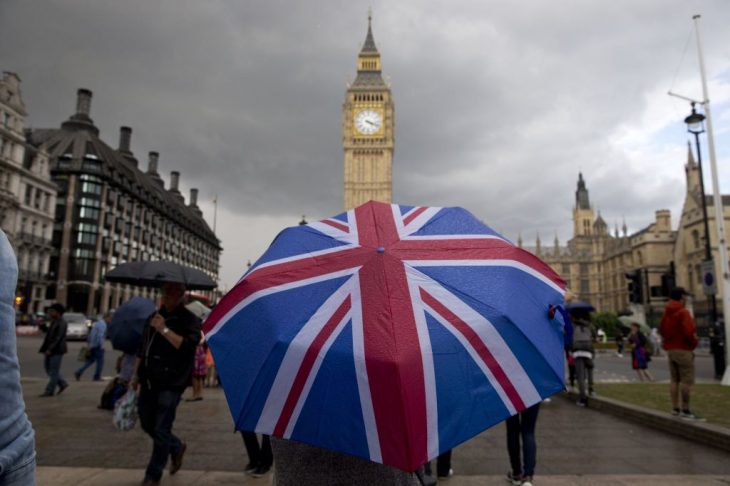The clock is ticking. At 12.30pm tomorrow, Theresa May will be on her feet in the Commons declaring that Article 50 has been triggered. Finally, nine months after the referendum, Britain will be heading out of the EU. The moment itself is likely to be underwhelming and we’re unlikely to find out much more of the Government’s actual Brexit plan. But already the Daily Telegraph has some suggestions.
This is the perfect moment for asking: ‘What type of country do we wish to be at the end of that journey?’, the paper says. Yes, Brexit is about ‘reclaiming sovereignty’. It is also about ‘reforming the state’, the Telegraph says, and it’s arguable that many Brexit-backers voted the way they did in order to ditch the ‘EU rules’ they were ‘sick and tired’ of ‘governing their lives and their businesses’. Thankfully, the Government is now making all the right noises about meeting their demands, and the Telegraph throws its weight behind the ‘excellent ambition’ of getting ‘rid of as many regulations as possible. ‘After all’, the paper asks, ‘how many times before have we been promised a bonfire of regulations?’. Before ‘politicians could blame failure to reform on EU membership’. But not so now. ‘Never has the country had such a marvellous opportunity to ask itself what on Earth these rules are for and which ones can go’, the Telegraph says.
Don’t be fooled, says the Times: Brexit isn’t all good news. The collapse of the power sharing agreement in Northern Ireland – and the stasis which is still paralysing Stormont couldn’t have come at a worse time for the British Government. Peace in Northern Ireland – and the country’s long-term future – is at stake. Yet the ‘stakes for Theresa May’s government are just as high’, the Times argues. If a power sharing agreement can’t be made, the consequences for Brexit could be ‘grave,’ the Times says. The paper reports that ‘the government has admitted for the first time that Northern Ireland would have a legal right under the Good Friday Agreement to a referendum on leaving the UK to join the Republic of Ireland (and thus the EU) if polls showed an appetite for such a move after Brexit.’. Of course, a referendum is merely hypothetical at the moment. But the Government would do well to remember that 56 per cent of people in Northern Ireland wanted to Remain in the EU during the referendum – and ensure that Northern Ireland is ‘kept closely involved in the Brexit process’. There’s no doubt that to ensure this, power sharing is needed. After all, ‘without a functioning executive the province will have no formal input’ – a state of affairs that will ‘play into the hands of nationalists seeking to foster resentment of Westminster’s authority’. Yesterday, Theresa May said in Scotland that she wants Brexit to lead to a more ‘united nation’. Her claim will be ‘robustly tested’ in Scotland. And so, too, will it be tested across the Irish Sea.
In the wake of the Westminster attack, politicians have aimed their ire at the tech companies who they say are allowing terrorists to communicate in secret. But the Guardian has a clear message: don’t listen to Amber Rudd when she says the likes of WhatsApp should allow a way in for the intelligence services to monitor messages: strong encryption makes us all safer, the paper says. Rudd has made a ‘hash’ of the aftermath of last week’s attack, the Guardian says, accusing the Home Secretary of being both ‘unrealistic and self-defeating’ in her solution. The paper says that ‘encryption cannot be selectively weakened’. After all, ‘if the encryption on terrorists’ messages were weakened so that the government could read them, the same weakening would apply to everyone else,’ the paper points out. What’s more, even if it were possible to offer the security services a way of breaking this encryption, the chatter of terrorists forms ‘an infinitesimal fraction of all the chat and gossip on the internet’ – picking the key bits out at the right time would be no more fruitful than ‘searching for a needle in a haystack’, the Guardian argues.
But the Sun disagrees. The paper says that Westminster attacker Khalid Masood was reportedly a fan of jailed hate preacher Anjem Choudary, whose videos are still easily available on YouTube. The Sun accuses the video website’s owner Google of ‘disseminating Choudary’s evil far more effectively than he did’, as it asks: what will it take ‘for…Google to stop pleading helplessness and prevent this filth being posted?’ The Sun also aims its ire at WhatsApp, which has been criticised by Home Secretary Amber Rudd after it emerged Masood was using the encrypted messaging platform in the minutes before the attack. ‘The cynical greed of US tech giants,’ the Sun says, ‘is helping spread terror throughout the world’.







Comments